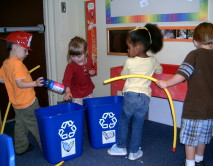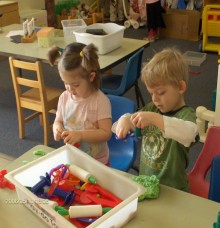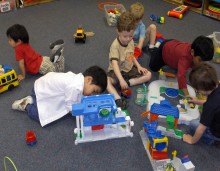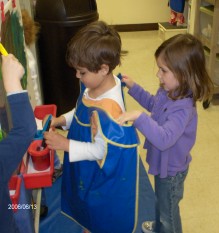 |
 |
 |
 |
|
SOMERSET ACADEMY FOR YOUNG CHILDRENFREQUENTLY ASKED QUESTIONS:The following questions are ones that are frequently asked about the program at Somerset Academy. 1. What are the qualifications of the teachers at Somerset Academy? Our staff consists of educators trained in early childhood education and who have extensive experience working with young children. All teachers have degrees in early childhood education, child development or other related fields of education. In addition to their academic training, the staff also participates in ongoing training and development. Teachers attend retreats, monthly planning meetings, professional association conferences, college courses and are encouraged to visit and observe other schools and early childhood centers. Visit the section “Meet Our Staff” to learn the details about our staff. 2. Is Somerset Academy accredited? Somerset Academy is accredited by the National Association for the Education of Young Children (NAEYC). This process involves implementing over 400 criteria in ten different standards. Our program is among a select few in the area who have undergone this comprehensive process of internal self-study and improvement. Somerset Academy is also licensed by the State of Michigan and meets all state requirements for both the preschool and prekindergarten programs. 3. Do the children have group times? Both programs have periods during each session when the children come together to share experiences, have music, movement, and story time. In addition, the schedule includes small group time – a group time specifically designed to introduce new materials and/or concepts, assess developmental levels and reinforce existing skills. 4. What is the teacher/child ratio in the preschool? There is one teacher for every seven children in the preschool. Our ratio is lower than the requirement mandated by the State of Michigan for early childhood centers. 5. What is the teacher/ child ratio in the prekindergarten? There is one teacher for every eight children in the prekindergarten. Our ratio is lower than the requirement mandated by the State of Michigan for early childhood centers. 6. What is the discipline policy at Somerset Academy? Somerset Academy considers discipline to be an educational experience for the child. We believe that each child needs to develop the skills to be self-disciplined. The teachers provide children consistency, choices with safe boundaries, skills and language to express needs, feelings, and emotions through appropriate behavior in a safe, loving and positive environment. Positive methods of discipline are used to encourage self-control, self-direction, and cooperation. Teachers use redirection, logical consequences and conversation with the child to help achieve the acceptable behaviors. Somerset Academy does not allow, under any circumstance, punitive and/or physical punishment administered to any child and does not use “time-outs”. Somerset Academy partners with Dr. Becky Bailey’s “Conscious Discipline” approach for a comprehensive classroom management and social/emotional curriculum. The research-based program is based on current brain research, child development information, and developmentally appropriate practices. Through both training and developmental sessions, Certified Conscious Discipline Instructors (CCDI) work with Somerset Academy staff members, building on their skills and knowledge of sound developmental principles. They also work with our parents through educational meetings regarding Conscious Discipline information and techniques. Books and educational materials on Conscious Discipline are available for parents to borrow in our parent resource areas. (http://www.beckybailey.com/conscious_discipline.cfm) 7. Is there a snack time or lunch time for children? Each program provides nutritious snacks for children during both morning and afternoon sessions. A lunch period from 12:00-12:30 may be either included as part of a child’s school schedule or added occasionally, based on available space. Lunch is provided by parents for their child/children. 8. What if my child doesn’t speak English? Communication with young children, even those speaking English, is often done in a non-verbal manner. Children demonstrate their needs through facial expression and other non-verbal cues. Our teaching staff is very skilled at supporting children through this type of communication. Children begin to learn English through peer/teacher communication, songs, and stories. 9. Will my child be safe at Somerset Academy? The safety of your child is a high priority at Somerset Academy. Systems are in place to ensure that only persons authorized by the parents in writing or listed on the emergency card will be allowed to sign-out a child from school. We require that a photo I.D. be shown by any person that a staff member is not familiar with. In addition, safety plans for all emergency situations have been established. Drills are practiced on a regular basis so that both staff and children are aware of procedure. The outdoor play area is secure and continually monitored by school staff. As required by the Department of Human Services (DHS), licensing for early childhood centers, thorough background and reference checks are performed on all staff prior to hiring. All teaching staff is trained in CPR, first aid, and emergency procedures yearly. 10. How is “separation anxiety” handled by staff? All staff recognize separation anxiety as part of appropriate development. In order to build upon existing trust, parents are encouraged to tell their child that they are leaving but will return. Lingering good-byes can be emotionally painful for the child so it is helpful if the time spent separating is short but supportive. After departure, parents may contact the school and speak with a staff member to ensure their child is beginning to adjust. If the staff feels the child is stressed, recommendations will be made to make the separation easier. Most children begin to feel more comfortable with increased attendance, as trust and familiarity with their new environment and teachers become part of the routine. 11. How does Somerset Academy communicate with parents about their children? Communication with families is an important part of the practices developed at Somerset Academy. Each school year begins with a parent orientation for both the preschool and prekindergarten programs. During the school year, monthly newsletters are provided to families with information specific to curriculum, program events, and general school information. Weekly e-mails are sent to share highlights and information in your child’s classroom. Teachers will provide parents with information about the development of their child at least once a week through verbal communication or short written notes. Conferences are scheduled twice yearly, once in the fall and once in the spring. During the conference, parents and teachers will discuss developmental progress, set goals, and develop ways to support each child. Parents are also encouraged to visit the classroom and participate in special events. SomersetAcademy.org also provides links for parents and potential families with program information, recent newsletters, suggested reading lists for parents and children, monthly calendars and other valuable information. Parent coffees are scheduled throughout the year and provide a great opportunity for parents to meet each other, address developmental concerns and receive information on early childhood topics. At least once a year, an evening seminar is scheduled for our families at which time information on an early childhood topic is presented by a professional in the field. 12. Does my child have to be toilet trained to attend Somerset Academy? Toilet training is a normal developmental part of the preschool program and children are not required to be toilet trained. It is necessary, however, for children to be toilet trained to enroll in the prekindergarten program. |



